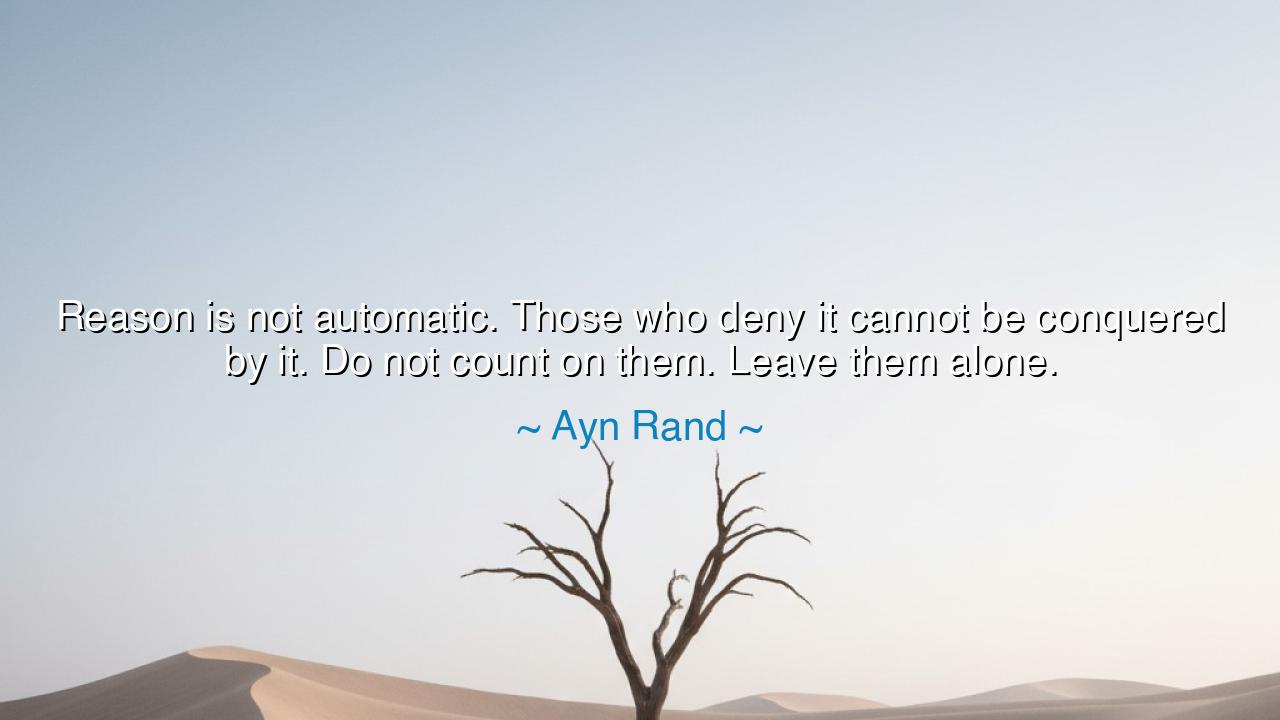
Reason is not automatic. Those who deny it cannot be conquered by
Reason is not automatic. Those who deny it cannot be conquered by it. Do not count on them. Leave them alone.






"Reason is not automatic. Those who deny it cannot be conquered by it. Do not count on them. Leave them alone." These powerful words by Ayn Rand speak to the very essence of human nature and the pursuit of truth. Reason, the guiding light of human progress and understanding, is not something that can be taken for granted. It is a conscious choice—a discipline that must be nurtured and upheld, for those who choose to reject it place themselves beyond its reach. Rand reminds us that reason, in its purest form, is not something that can be forced upon others; it is a freedom to choose, a capacity to think, that must be embraced freely by the individual.
The ancient philosophers understood the value and power of reason. Socrates, in his pursuit of knowledge, believed that true wisdom lay in the constant questioning of the world around us, in seeking to understand and rationalize our beliefs and actions. He saw reason as the path to virtue, the cornerstone upon which a noble and moral life was built. But Socrates also understood that not everyone would follow this path. There were those who rejected reason, who clung to tradition, emotion, or ignorance. These people, he knew, could not be reasoned with, and thus, his teachings reached only those who were open to the light of understanding.
The Romans, too, revered reason. Cicero, a great Roman statesman and philosopher, wrote extensively on the role of reason in governance and personal life. For Cicero, reason was the foundation of justice and order. He believed that reason should guide not only the actions of individuals but the actions of the state as well. Yet, even Cicero knew that reason could not be forced upon those who refused it. In times of great unrest, it was not the irrational and the emotional that could be swayed by reason, but those who had already laid the foundation of thoughtful deliberation. Thus, like Rand, Cicero understood that there would always be those who could not be conquered by reason, those who rejected it out of fear, pride, or stubbornness.
A powerful example of this can be seen in the struggle between Martin Luther King Jr. and the forces of racial segregation in the United States. King, a champion of reason, justice, and nonviolent resistance, sought to dismantle the deeply entrenched systems of racial injustice through peaceful protest and rational discourse. Yet, despite his reasoned approach, he faced intense opposition from those who clung to ignorance, hatred, and fear. These opponents were not swayed by reason, no matter how eloquent or righteous King’s arguments were. In fact, many actively rejected the idea that equality and justice were based on reason, and they fought against the very logic of King's message. Despite the weight of his reason, King understood that some people could not be reached by rational thought alone, and in the end, it was the strength of his moral conviction, backed by the resolve of the people, that forced change.
Rand’s wisdom in recognizing that those who deny reason cannot be conquered by it is a profound truth for our own time. Today, we live in an age where emotion often trumps logic, where rhetoric and opinion are more valued than critical thinking. In politics, social media, and personal relationships, we see that reason is often ignored or dismissed, replaced by tribalism, passion, or fear. In such times, we are often faced with the dilemma of trying to reason with those who have no interest in hearing the truth. Rand's advice is to recognize when to step back—to acknowledge that, though we may offer reason, it is not always our duty to change the minds of those who have closed themselves off from it.
The lesson here is one of wisdom and discernment—to know when to engage in rational discourse and when to let go. We must choose wisely where to direct our energies. While it is noble to seek to bring others to reason, it is also wise to preserve our peace and focus our efforts on those who are open to growth and change. Not every soul is ready to embrace reason, and sometimes, our greatest power lies in knowing when to walk away—to leave those who deny reason in their ignorance, and to invest our energy in those who are willing to seek the truth.
In our own lives, let us strive to be the bearers of reason, but let us also understand that reason is a choice. To impose it on those who have rejected it is not only fruitless but can lead to exhaustion and frustration. Instead, let us focus on nurturing our own clarity of thought, and seek to share it with those who are open to it. For in the end, reason is not an imposition—it is an invitation, a gift for those willing to accept it. When we recognize those who are ready to receive this gift, we can shape the world with wisdom, not force. Let us not waste our energy on those who cannot be conquered by reason, but instead, let us walk in step with those whose hearts and minds are open to the truth.






AAdministratorAdministrator
Welcome, honored guests. Please leave a comment, we will respond soon